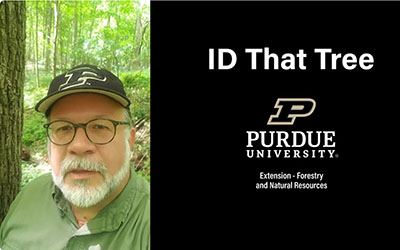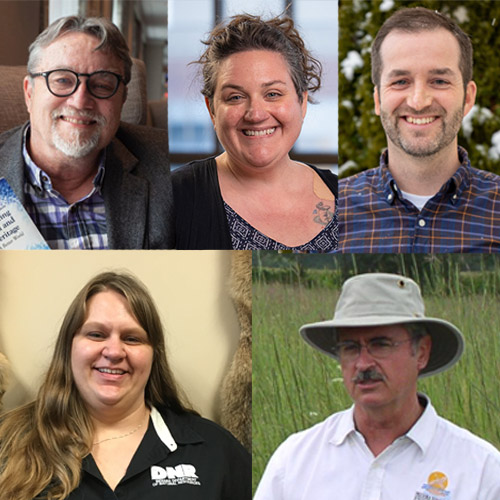FNR Field Report: Mikaela Agresta
Students from Purdue Forestry and Natural Resources took their classroom knowledge to the field for summer internships and paid positions across the country, gaining valuable experience, hands-on training and career guidance. The FNR Field Reports series will offer updates from those individuals as summer positions draw to a close.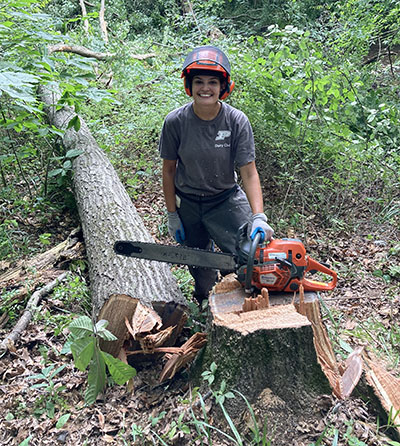
Mikaela Agresta, who completed her degree in forestry with a minor in wildlife science in May 2023, worked as a forestry intern under Ron Rathfon at the Southern Indiana Purdue Agricultural Center (SIPAC) this summer.
The Mooresville, Indiana, native planted trees, treated invasives, completed pole thinnings, marked timber, mowed/bush hogged, moved goats and fencing, completed vine control, wrote management plans, took timber inventory and visited different employers and their workplaces.
“I learned how important forestry work is for the environment,” Agresta said. “Spending countless hours fighting invasives, creating canopy gaps, and monitoring different stands really gave me an insider's perspective on how important my job is. Without foresters, land would be taken over by invasives, trees would constantly be damaged from insects/weather/competition/grazing. When a forester goes into the woods, it’s like a doctor doing a check-up on a patient.”
Agresta was able put to her coursework into action during the internship.
“Every single forestry class I took at Purdue was used this summer,” Agresta shared. “I also built off my prior knowledge from my schooling as well. Having a minor in Wildlife Science gave me a different perspective on forest management as well that I found to be useful when making decisions for the future.”
One highlight of the summer was an extension event in August titled Prescribed Grazing Using Goats,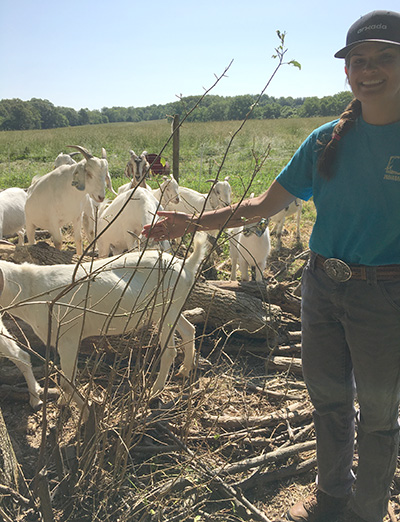 where Agresta taught attendees how prescribed grazing can be a useful tool in forest management. She shared about the history and background of prescribed grazing, its impacts on native vegetation, necessary equipment and costs, caring for goats in the wild and incorporating prescribed grazing into an invasive species management program.
where Agresta taught attendees how prescribed grazing can be a useful tool in forest management. She shared about the history and background of prescribed grazing, its impacts on native vegetation, necessary equipment and costs, caring for goats in the wild and incorporating prescribed grazing into an invasive species management program.
“I loved getting to hold a Prescribed Grazing extension event at SIPAC over the goats,” Agresta said. “Getting to interact with the public about goats and their usefulness in managing invasives made me excited! I love getting people passionate about the outdoors. I think this position solidified how much I want to work in extension. I really enjoyed the event I held and getting the public talking about land management. I hope to continue this passion into the future as I work towards completing a master’s degree.”
Agresta said her colleagues were a key to a great summer on the job.
“Constantly being flexible when issues arise, or equipment breaks, or the weather doesn’t cooperate was a challenge,” Agresta said. “I like to see projects through, and sometimes we had to readjust what the priorities were based on what was happening that day. The people I worked with and for were some of the best coworkers and supervisors I’ve ever had. They were constantly supporting me, challenging me to do better, and just enjoying the work we were doing. I think the people you surround yourself with will really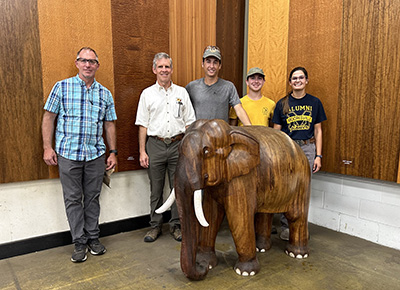 make or break a job. If you’ve got good people around you, you can make any task a fun one, even if the work itself isn’t so great.”
make or break a job. If you’ve got good people around you, you can make any task a fun one, even if the work itself isn’t so great.”
Agresta has surrounded herself with others who were passionate about natural resources throughout her time at Purdue. As an undergraduate, she was part of the Purdue student chapter of the Society of American Forestry, the Purdue Student Chapter of The Wildlife Society and acted as a teaching assistant for Summer Practicum. She also was involved with Sigma Alpha, a professional and social agricultural sorority.
Agresta will continue to work in the FNR woodlands throughout the fall semester as she applies for graduate school beginning in January 2024.
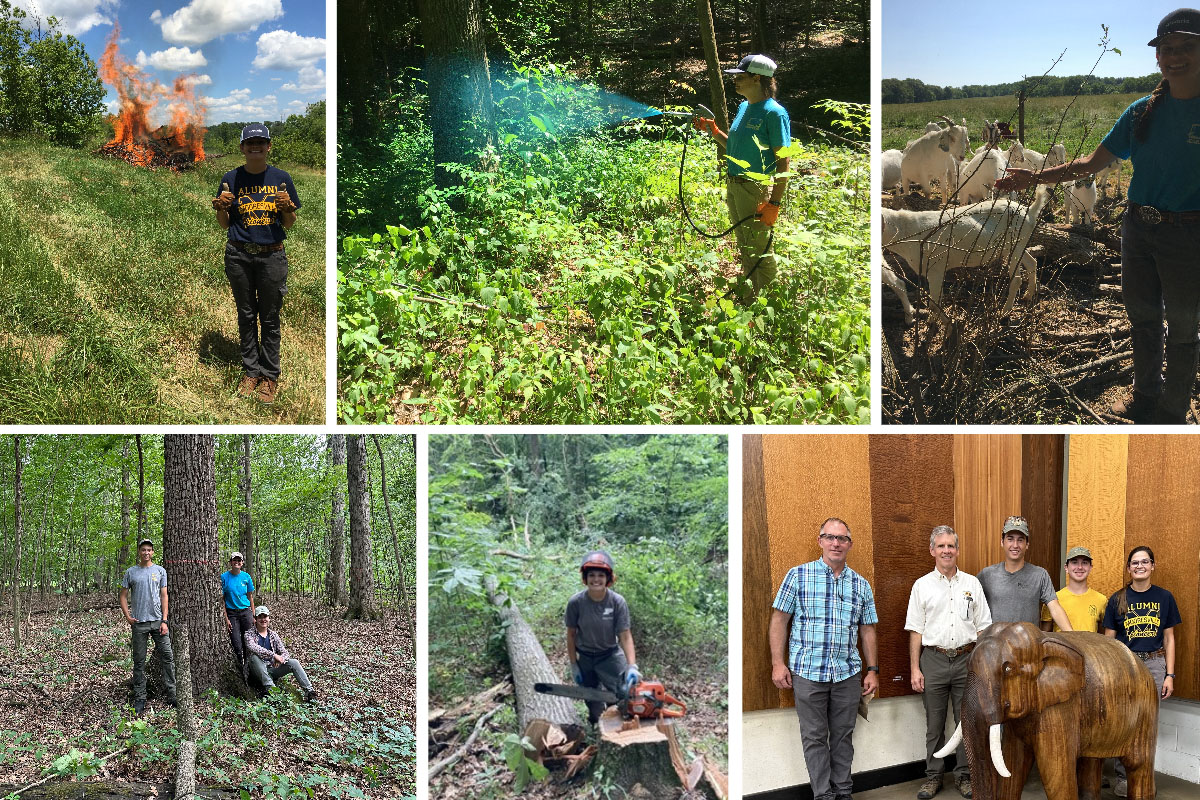 Top Row (Left to Right): Mikaela Agresta next to a burn pile she was in charge of igniting, monitoring and controlling; Mikaela spraying invasive species with a UTV sprayer; Mikaela next to forestry goats, showing the damage they have done to invasive species due to grazing. Row 2 (Left to Right): Mikaela with fellow forestry interns Zach Smoldt and Andrew Tucker; Mikaela next to a heavily leaning red oak that she felled at SEPAC; Don Carlson, Ron Rathfon, Zane Smoldt, Andrew Tucker, and Mikaela visiting Bohlke Lumber Mill the last week of the internship.
Top Row (Left to Right): Mikaela Agresta next to a burn pile she was in charge of igniting, monitoring and controlling; Mikaela spraying invasive species with a UTV sprayer; Mikaela next to forestry goats, showing the damage they have done to invasive species due to grazing. Row 2 (Left to Right): Mikaela with fellow forestry interns Zach Smoldt and Andrew Tucker; Mikaela next to a heavily leaning red oak that she felled at SEPAC; Don Carlson, Ron Rathfon, Zane Smoldt, Andrew Tucker, and Mikaela visiting Bohlke Lumber Mill the last week of the internship. 



